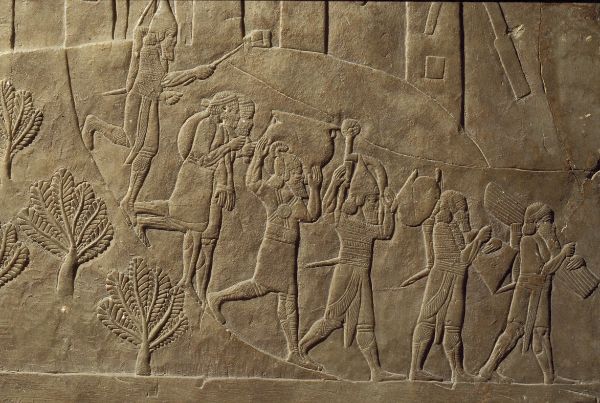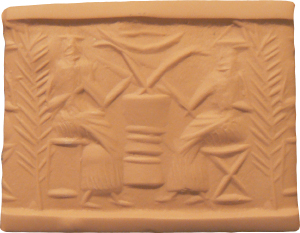“So Shall It Be Done to You” (8–16)
Teman (9). Teman (“the south”), like Esau, denotes Edom12 and was apparently the home of Job’s supposedly wise friend Eliphaz (e.g., Job 2:11). Jeremiah’s parallel oracle asks if wisdom has left Teman, in view of Edom’s attitude to Judah (Jer. 49:7).
Cast lots (11). Where a decision had to be made that could result in inequity, such as with looted objects that could not be divided, throwing lots was an acceptable solution in the ancient world (Josh. 18–19; Ps. 22:18; Prov. 18:18). Laws from Assyria prescribe that the eldest brother, after choosing the primary portion of his estate, should throw lots equally with his brothers for his second share (cf. Jonah 1:7).13

Seventh century relief of soldiers taking booty from a captured town
Z. Radovan/www.BibleLandPictures.com
Gates (11, 13). Every settlement of any size was walled to keep out human and animal foes, the gates being closed at night (see Josh. 2:5). Unhindered passage through the gate was the privilege of free citizens; slaves and others needed permission (see Gen. 23:10; 34:24). Babylonian laws a thousand years or more before Obadiah’s time prescribe that “a slave or slave woman belonging to (a resident of) Eshnunna who bears fetters, shackles, or a slave hairlock will not exit through the main gate of Eshnunna without his owner.”14 With unguarded gates, a defeated city was open to any looter; enemies moving freely through the gates demonstrated the complete defeat of the inhabitants.
Excavations at many ancient towns have uncovered defensive walls and gateways. Sometimes the gateway had a dogleg plan, as at Dan and Tirzah, forcing any enemy who entered to turn sharply to one side and thus putting the defenders at an advantage. Several major towns of the monarchy period (e.g., Megiddo, Gezer, Hazor, Lachish) had gates with two or three rooms on either side of the passageway, presumably for guards to check who went in and out of the town.15
Drink (16). From early times, drinking bouts have been popular, leading to stupefaction.

Cylinder seal shows figures drinking beer through long straws.
Kim Walton, courtesy of the Oriental Institute Museum
Edom’s enjoyment of Judah’s disaster, like excessive drinking, brings her down to the level of all other nations (cf. Lam. 4:21). Partying to excess was not uncommon in the biblical world.16 According to the Babylonian Epic of Creation, while the gods were merrily drinking beer, they established Marduk as their champion to fight the chaos monster Tiamat (Enuma Elish 3.136), while at Ugarit one text depicts the great god El becoming thoroughly drunk and disgraced.17